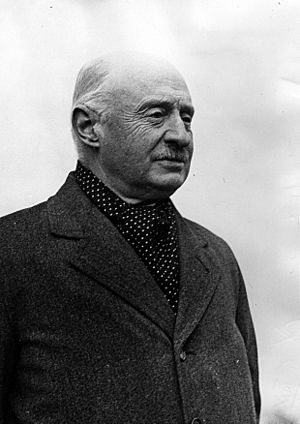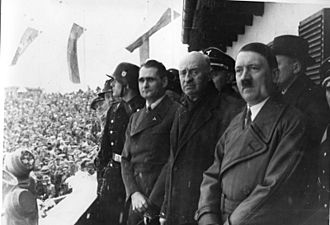Henri de Baillet-Latour facts for kids
Quick facts for kids
Henri de Baillet-Latour
|
|
|---|---|

Henri de Baillet-Latour by the mid-1930s
|
|
| 3rd President of the International Olympic Committee | |
| In office 1925–1942 |
|
| Preceded by | Pierre de Coubertin Godefroy de Blonay (acting) |
| Succeeded by | Sigfrid Edström |
| Personal details | |
| Born | 1 March 1876 Brussels, Belgium |
| Died | 6 January 1942 (aged 65) Brussels, Belgium |
Henri de Baillet-Latour (born March 1, 1876 – died January 6, 1942) was a Belgian nobleman. He became the third president of the International Olympic Committee (IOC).
Contents
Early Life and Family
Henri de Baillet-Latour was born in Brussels, Belgium, on March 1, 1876. He was the oldest of three children. His father, Count Ferdinand de Baillet-Latour, was a former governor of the Antwerp Province. His mother was Countess Caroline d'Oultremont de Duras.
He studied law at the University of Louvain in Belgium from 1895 to 1897. He married Countess Elisabeth Clary-Aldringen on July 14, 1904. They had a son, Guy Siegfried Ferdinand, born in May 1905, and a daughter, Sophie Thérèse Ghislain Marie, born in February 1908.
His Work with the Olympics
Starting the Belgian Olympic Committee
Henri de Baillet-Latour became a member of the IOC in 1903. He was given the job of organizing sports in Belgium. In 1906, he helped create the Belgian Olympic Committee. He was in charge of getting Belgium ready for the London Olympics in 1908 and the Stockholm Olympics in 1912.
Organizing the 1920 Antwerp Games
He played a key role in bringing the 1920 Summer Olympics to Antwerp, Belgium. There was only one year to get ready for the Games. Belgium was still recovering from the First World War. Despite the challenges, he took on the big task of organizing the event. The 1920 Games were a great success, which earned him much respect from his fellow IOC members.
Leading the International Olympic Committee
In 1925, Pierre de Coubertin, who started the modern Olympic Movement, retired as president of the IOC. Henri de Baillet-Latour was chosen to take his place. After the 1928 Olympics, he tried to stop women from taking part in all Olympic sports, but he was not successful.
He was re-elected as IOC President in June 1933. He held this important position for 17 years until he passed away in 1942. As president, he worked to keep the traditional ideas and honesty of the Olympics strong. He also supported amateur sports around the world. This was a time when politics and business were putting more pressure on sports.

Baillet-Latour did not agree with boycotting the 1936 Berlin Olympic Games.
In June 1939, the IOC voted for Germany to host the 1940 Winter Games. Japan had given up its right to host these games. De Baillet-Latour said that choosing Germany, which had taken over parts of Czechoslovakia a few months earlier, showed that the IOC was independent of political influences.
Death
Henri de Baillet-Latour died from a heart attack on January 6, 1942, in Brussels.
Four months before he died, his only son passed away at age 36. His son died in a plane crash in Scotland while serving with the Free Belgian forces.
After Henri de Baillet-Latour's death, his vice-president, Sigfrid Edström, became the new IOC president.
See also
 In Spanish: Henri de Baillet-Latour para niños
In Spanish: Henri de Baillet-Latour para niños
- House of Baillet
 | Aurelia Browder |
 | Nannie Helen Burroughs |
 | Michelle Alexander |

